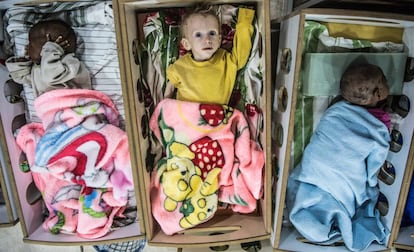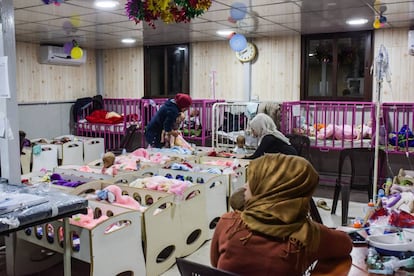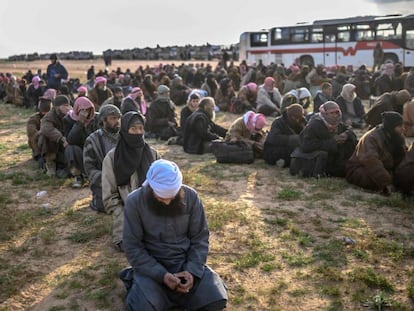The uncertain future of the children of ISIS fighters
In a Kurdish hospital in northeastern Syria, 75 kids born to killed or detained Jihadists are fighting to survive


¡°Take care of my children, because even if I die, they are the seeds of the Caliphate.¡± This is what a Jihadist woman told the head nurse of a Kurdish hospital in northeastern Syria, pointing to the cribs of the more than 75 children of Islamic State (ISIS) fighters who are fighting for their lives. These children of African, Asian and European descent?were born in Baghouz, in eastern Syria, a former ISIS stronghold?on the border with Iraq, and evacuated from ISIS camps in the Syrian desert. Some of them are orphans, but others are visited by their mothers who remain captive in nearby camps.
Whatever the crimes their parents have committed, the children? are clearly innocent victims of the conflict Paul Donohoe, International Rescue Committee
Hardly any of the children here are more than three years old. Stigmatized for being the offspring of Jihadists, their mere existence poses a problem for their parents¡¯ countries of origin. Some governments have decided to either repatriate them or allow them to return, while others have refused to take responsibility for kids who do not yell out jihadist messages, but simply cough and cry in their cribs.
The children have gaunt, yellow faces and shaved heads, some with burn marks, others with stitches. These scars are the only signs that they have survived a war. In the largest crib in the room, three children sit quietly. They do not cry, or moan, or react to caresses. These bony-armed kids are struggling to stay alive. Since December, 123 children have died from malnutrition, hypothermia and respiratory problems.

A nurse at the Kurdish hospital asks to go by the pseudonym Maya because she fears reprisals from ISIS. She is in charge of a team of 12 caregivers and three other health professionals who have been looking after the children. ¡°Many Jihadists have escaped from camps and we fear that they will come here and seek revenge for the children who have died,¡± she says, asking that the name of the hospital not be mentioned either. A woman who says her name is Meriam el Al¨ª enters the room. In fluent English, the 20-year-old Norwegian citizen of Somali origin?defiantly demands care for her nephew, a sad-looking baby with long eyelashes. The caregivers give a withering look.
Since December, 123 children have died from malnutrition, hypothermia and respiratory problems
¡°We make a huge effort to maintain tens of thousands of ISIS members in camps and prisons with the limited resources we have, while also treating our own wounded, fixing infrastructure and [dealing with] the cost of war,¡± says a Kurdish security officer. ¡°What we are asking is for their countries of origin to take charge.¡±
¡°Whatever the crimes their parents have committed, the more than 3,500 foreign children who languish in the different camps in northeastern Syria are clearly innocent victims of the conflict and they should be repatriated to their countries of origin to guarantee their safety and wellbeing,¡± says Paul Donohoe, spokesperson for an NGO called the International Rescue Committee (CIR), which works in camps in northeastern Syria. ¡°We¡¯ve already surpassed 75,000 people,¡± says an employee of the Al-Hol camp. The charity Save the Children says that 40,000 minors are living at the camp, 250 of whom are unaccompanied, according to CIR.
The small blue and pink bracelets which encircle the wrists and ankles of these children are used to determine their gender and their names. In crib 15, one bracelet reads mahjul, the Arabic word for unknown. Maya estimates that there are at least 20 orphans in the two rooms, and out of all of them, the nameless child is the only one who can manage a smile.
English version by Asia London Palomba.
Tu suscripci¨®n se est¨¢ usando en otro dispositivo
?Quieres a?adir otro usuario a tu suscripci¨®n?
Si contin¨²as leyendo en este dispositivo, no se podr¨¢ leer en el otro.
FlechaTu suscripci¨®n se est¨¢ usando en otro dispositivo y solo puedes acceder a EL PA?S desde un dispositivo a la vez.
Si quieres compartir tu cuenta, cambia tu suscripci¨®n a la modalidad Premium, as¨ª podr¨¢s a?adir otro usuario. Cada uno acceder¨¢ con su propia cuenta de email, lo que os permitir¨¢ personalizar vuestra experiencia en EL PA?S.
?Tienes una suscripci¨®n de empresa? Accede aqu¨ª para contratar m¨¢s cuentas.
En el caso de no saber qui¨¦n est¨¢ usando tu cuenta, te recomendamos cambiar tu contrase?a aqu¨ª.
Si decides continuar compartiendo tu cuenta, este mensaje se mostrar¨¢ en tu dispositivo y en el de la otra persona que est¨¢ usando tu cuenta de forma indefinida, afectando a tu experiencia de lectura. Puedes consultar aqu¨ª los t¨¦rminos y condiciones de la suscripci¨®n digital.










































